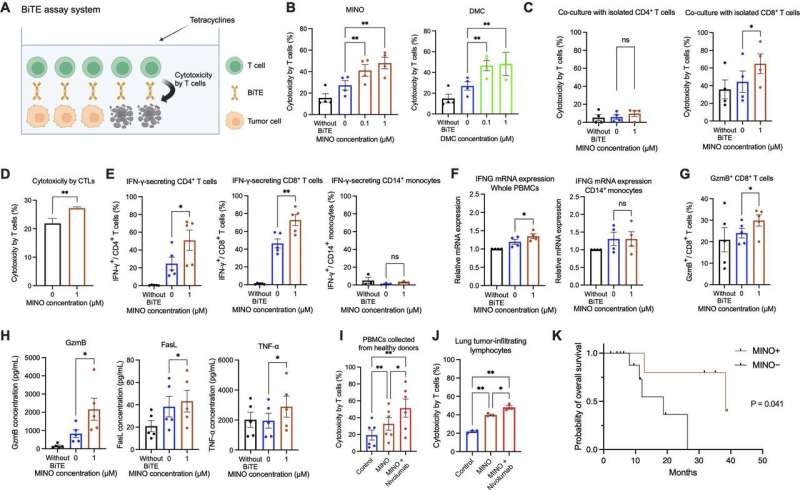This article has been reviewed according to Science X's editorial process and policies. Editors have highlighted the following attributes while ensuring the content's credibility:
fact-checked
peer-reviewed publication
trusted source
proofread
Antibiotics reveal a new way to fight cancer

Cancer cells grow and spread by hiding from the body's immune system. Immunotherapy allows the immune system to find and attack hidden cancer cells, helping cancer patients live longer lives. However, many patients get little or no benefit from these revolutionary treatments.
Immune checkpoint inhibitors are the most used immunotherapies. They work by recognizing and blocking proteins that cancer cells use to hide from the immune system. However, cancer cells that don't have these proteins use different ways to hide. Since patients with these cancers don't respond to immune checkpoint inhibitors, researchers are keen to develop new immunotherapies with different targets.
In a study published in the Journal for ImmunoTherapy of Cancer, researchers from Osaka University have discovered that tetracycline antibiotics help the immune system to find cancer cells in a way that is different from current immunotherapies. These antibiotics stimulate immune cells, known as T lymphocytes, to attack and destroy cancer cells.
"We investigated the tetracycline antibiotic minocycline in blood and tumor tissue from lung cancer patients," says lead author Mari Tone. "We found that minocycline enhanced the antitumor activity of T lymphocytes by targeting galactin-1, which is an immunosuppressive protein produced by cancer cells."
The team found that galactin-1 helps cancer cells hide from the immune system by preventing cytotoxic T lymphocytes from reaching the tumor. After treatment with tetracycline, galactin-1 was no longer able to stop the T lymphocytes from attacking the tumor. Blocking galactin-1 might just be the key to new cancer treatments.
"These antibiotics have a different mechanism of action from immune checkpoint inhibitors and other immunotherapies used to treat cancer," says corresponding author Kota Iwahori. "We hope this research will lead to the development of new drugs that target different immune pathways and can benefit people with cancer, particularly those who don't benefit from current immunotherapies."
Tetracycline antibiotics have been used to treat patients with infectious diseases for many years worldwide. Now, these old drugs may point the way to new immunotherapies for cancer patients who currently have few treatment options.
More information: Mari Tone et al, Tetracyclines enhance antitumor T-cell immunity via the Zap70 signaling pathway, Journal for ImmunoTherapy of Cancer (2024). DOI: 10.1136/jitc-2023-008334

















